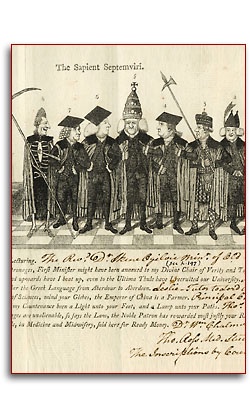This is a past event
A workshop on 28-29 October 2022, supported by the AHRC Research Networking Scheme brought to Aberdeen by Cassie Gorman (Anglia Ruskin University) and Stefano Gulizia (University of Miland and Polish Institute of Advanced Studies, Warsaw), in cooperation with the Museum and Special Collections, University of Aberdeen
This workshop is the annual conference of the research group, Scientiae: Disciplines of Knowing in the Early Modern World (http://scientiae.co.uk/)
Anglophone scholarship has overwhelmingly privileged the history of correspondence in early modern Europe at the expense of knowledge-making (and sharing) across Northern and Baltic locations. Our workshop series responds to this gap, with the primary aim of drawing a new map across Northern European centres of learning. The objective is twofold. Firstly, the network emphasises the impact of academic mobility through the early modern migration of people and ideas, identifying, for the first time, an epistemic unity from the Baltic to Central Europe which linked geographical areas that might otherwise seem separate. Secondly, this focus fosters closer, interdisciplinary work on collections of early modern knowledge that have been hitherto marginalised within Anglophone scholarship. The network transcends national and disciplinary boundaries by bringing together intellectual historians, historians of science, literary scholars, art historians, maritime historians, linguists, and curators, from the UK, continental Europe, and North America. Northern Networks provides a platform for these different academic communities - who rarely otherwise collaborate in research - to meet, share and expand knowledge of the understudied intellectual networks across early modern Northern Europe.The first workshop will be held at the University of Aberdeen in March 2022. The focus will be on sixteenth and seventeenth-century medical research and academic mobility between Scotland and continental Europe. Our aim, drawing on the rich collections at the Sir Duncan Rice Library, is to reconsider the foreign transactions in medical research that paved the way to Isaac Newton's era in the British Isles. This workshop will focus especially on the archive of the physician Duncan Liddel (1561-1613) and the work of the Edinburgh-born medical practitioner John Craig (died 1620), who was first physician to James VI, later James I of England, and a practicing astronomer. Both the geographical focus and the designated time period of this research have been overlooked by past scholarship, which has tended to focus on continental academic activity during the 'Republic of Letters', later in the seventeenth century.
Programme
Friday, 28 October
10am: coffee on arrival
10.30: Welcome remarks: Stefano Gulizia and Cassie Gorman
11.00 – 12.30, Panel 1 (Aberdeenshire networks, chaired by Cassie Gorman)
David McOmish: ‘Failures and successes in educational reform in the new sciences at the universities of Aberdeen and Edinburgh: Duncan Liddel and the Edinburgh circle’
Andrew Gordon: ‘The Print Voyages and Literary Communities of Alexander Craig of Rosecraig’
12.30-1.30, lunch
1.30 – 3.30, Panel 2 (continental networks, chaired by Stefano Gulizia)
Kathrin Zickermann: ‘Scots in Early Modern Pomerania’
Catherine Jones: ‘Scottish Travellers to the Early Modern Netherlands and Russia’
Riccarda Suitner: ‘Scientists, Encyclopedists, and Exorcists: a Demonological Debate in Early Eighteenth-Century Germany’
3.30 – 4.00, coffee and refreshments
4 – 5.30, Duncan Liddel’s library, exhibition and talk from Jane Pirie
5.30, drinks
7.00, dinner
Saturday, 29 October
9.30 – 10am, coffee
10.00 – 12.00, Panel 3 (astronomy, medicine and maths, chaired by Karin Friedrich)
Vladimír Urbánek: ‘Medicine, Chronology and Transfer of Knowledge in the Thirty Years War: Simeon Partlicius and his Search for Patronage’
Richard Oosterhoff: ‘Henri de Monantheuil: Medicine and maths after Ramus and before Liddel was in Paris’
Stefano Gulizia: ‘A Bottomless Lake: Ambrosius Rhodius (1605-96) and the Origins of Early Modern Paracelsianism in Saxony and Denmark’
12.00 – 1.00, lunch
1.00-2.30, closing comments from Cassie Gorman and round-table discussion: emerging themes and ways of moving forward
- Hosted by
- Centre for Early Modern Studies in cooperation with the Museum and Special Collections
- Venue
- Seminar Room One
- Contact
-
Prof. Karin Friedrich and Prof. Andrew Gordon

